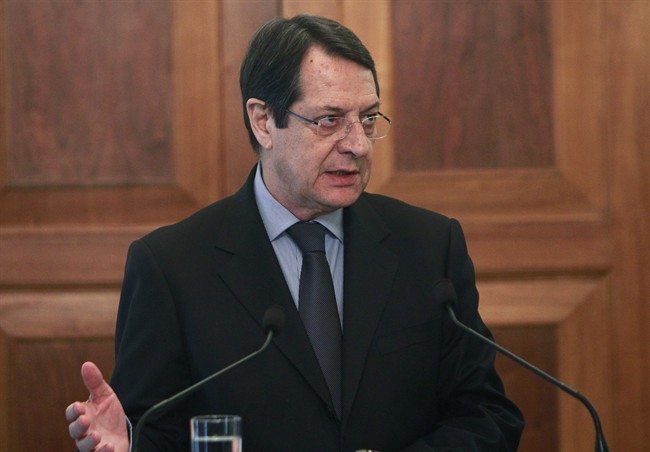NICOSIA, Cyprus – The International Monetary Fund said Wednesday it will contribute 1 billion euros to an overall financial rescue package of 10 billion euros ($12.8 billion) for Cyprus.

The IMF’s managing director Christine Lagarde said the contribution would be made via a three-year loan that’s expected to be cleared by the fund’s executive board in early May.
Earlier this week, the final terms of the Cyprus bailout were agreed between the small Mediterranean island nation and the European Union and the IMF, following a protracted crisis that saw the country’s banking sector shut down for the best part of two weeks.
Lagarde and Olli Rehn, the top monetary affairs official at the European Commission, the EU’s executive arm, said “significant challenges lie ahead for Cyprus” as the government sets in motion a multi-year program of reforms to rebuild its banking sector and austerity.
Apart from spending cuts and tax increases worth around 5 per cent of Cyprus’ annual gross domestic product that have already been put in place, Lagarde said the country will need to do more. She said Cyprus will have to raise another 2 per cent through measures such as a corporate tax rate hike from 10 to 12.5 per cent, and the doubling of the interest rate tax to 30 per cent.
The IMF chief said an additional 4.5 per cent will be needed over the medium term if the country is to achieve a budget surplus worth 4 per cent of its annual GDP by the target date of 2018. That surplus is needed to get the country’s debt “on a firmly downward path.”
“This is a challenging program that will require great efforts from the Cypriot population,” Lagarde said. “We believe that it provides a durable and fully financed solution to the underlying problems facing Cyprus and provides a sustainable path toward a recovery.”
EU Commission spokesman Olivier Bailly said the bailout will need parliamentary approval from several of Cyprus’ euro partners by the end of this month so that the first batch of rescue money can reach Cyprus in May.
“We think this is a good agreement in the regard that it addresses the three main problems of the Cypriot economy,” said Bailly.
To secure the bailout, Cyprus had to agree that bondholders, investors and savers in the country’s two biggest banks — Bank of Cyprus and Laiki — take a hit.
Laiki, the country’s second-largest lender, will be broken up with depositors with more than 100,000 euros ($128,000) taking major losses. Savers with more than 100,000 euros at the Bank of Cyprus could face losses of up to 60 per cent as part of the rescue deal.
The remaining 40 per cent of those large Bank of Cyprus deposits remain frozen “for liquidity reasons.” But the country’s central bank said on Wednesday that a quarter of that 40 per cent would be freed up to allow cash-starved businesses to keep running.
To head off a potential bank run, Cypriot authorities imposed restrictions on how much people can take out of their accounts when they reopened last week after a nearly two-week closure to allow politicians to hammer out the bailout deal.
The restrictions — the first-ever imposed in the 17 member group of countries that use the euro — included a daily cash withdrawal limit of 300 euros and a cap of 1,000 euros in cash for people leaving the country.
The Finance Ministry said late Wednesday that the restrictions would be extended for another three days starting Thursday, with another renewal expected after then.
New Finance Minister Harris Georgiades said the restrictions would be lifted “gradually,” with Cypriot authorities expecting them to remain in place for around a month. Georgiades officially took over his new post on Wednesday from Michalis Sarris who stepped aside just five weeks into the job as an investigation got underway into what led the country to near financial collapse. Sarris last year headed Laiki as the bank tried to woo investors without asking for state aid.
“We do need assistance today, but we shall do as I have said whatever it takes to fix our public finances and put our economy on track for growth and development,” Georgiades told reporters. “I am optimistic that even though today’s circumstances might be bleak, the medium and long-term prospects remain excellent.”
Georgiades said the government is determined to meet all bailout targets and is already preparing a raft of measures “that go above and beyond” what’s outlined in the rescue plan to promote growth.
____
Juergen Baetz in Brussels contributed.



Comments